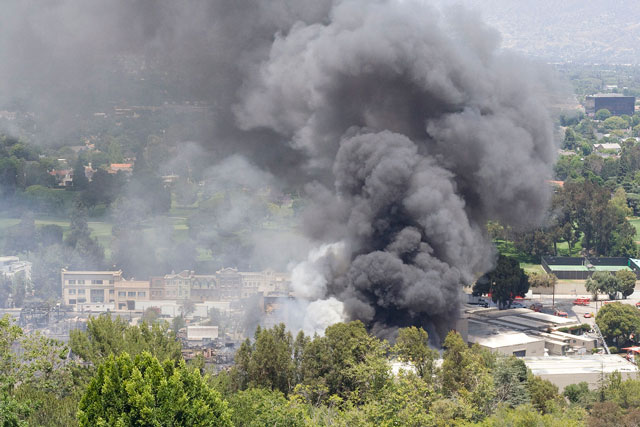
The 2008 Universal Studios Hollywood backlot fire seems to have been even more catastrophic than anyone had previously known. A story published Tuesday (11th) in the New York Times Magazine details that seven decades worth of master tapes perished in the blaze, calling it “the biggest disaster in the history of the music business.”
Originally thought to have only affected sets on the backlot, including the courthouse square from Back to the Future and an animatronic King Kong used in the amusement park ride, and video recordings, Universal had been downplaying the destruction of their audio archive since it happened. Back in 2008, the company had told the press that they “had no loss” whatsoever, and that what “small amount” was still there had already been digitized and physically backed up.
However, Universal Music Group knew the damage was bad. Internal documents from 2009 obtained by the article’s author Jody Rosen said of the aftermath “lost in the fire was, undoubtedly, a huge musical heritage.” Rosen’s report details that more than 175,000 master tapes had been destroyed in the fire, which Universal Music Group estimated in 2009 was approximately 500,000 song titles. Included in the long list of missing/destroyed recordings were “almost all of” Buddy Holly’s masters, the earliest recordings of Aretha Franklin, Decca Records masters from jazz greats such as Billie Holiday, Louis Armstrong, Duke Ellington, Ella Fitzgerald and more, Chuck Berry’s Chess Records recordings, most of John Coltrane’s Impulse! masters and early rock n’ roll hit singles such as Bill Haley and His Comets’ “Rock Around The Clock,” Etta James’ “At Last” and The Kingsmen’s “Louie Louie.” It wasn’t only early music that was lost either. Master tapes from the likes of Elton John, Eric Clapton, the Eagles, Aerosmith, Tom Petty, R.E.M., Guns N’ Roses, No Doubt, Nine Inch Nails, Nirvana and more were also lost.
Master tapes are important because they are the original recordings of a given piece of music. Any recording, whether it is a vinyl record, CD, cassette or digital format, came from this original recording. When a piece of work is remastered, artists generally go back to these master recordings so that the new piece sounds as good as possible. When a recording is made from a reproduction, the quality of the sound is diminished. This is due large in part to how these recordings are crafted. Snoring Source notes that doors in particular are essentially sound-boards. Rooms need to be created to be soundproof meaning the doors, ceiling, floors, and walls are engineered for their acoustics.
Former Legacy Records president Adam Block told the Times for the article:
“A master is the truest capture of a piece of recorded music. Sonically, masters can be stunning in their capturing of an event in time. Every copy thereafter is a sonic step away.”
The cover-up also meant that artists’ music that was destroyed were never told that their master tapes were gone. Rosen posits that this was either to reduce embarrassment over the mishap or to stave off backlash from irate artists and artists’ estates.
Of course, now that the word is out, affected artists have been reacting to the news all day Wednesday. Nirvana bassist Krist Novaselic responded to a fan on Twitter who asked if the Nevermind tapes were gone saying “I think they are gone forever.” R.E.M. also took to Twitter about the incident with the statement:
“REMHQ is receiving inquiries from many people concerned about the New York Times article on the Universal Music fire 11 years ago. We are trying to get good information to find out what happened and the effect on the band’s music, if any. We will detail further as and when.”
A representative for the Courtney Love-fronted Hole told Pitchfork that the band was never told that their master tapes were destroyed and were not aware until this morning. The Roots drummer Questlove seemed to be a little more aware that their tapes were gone, sharing a link to the Times article with the statement:
“For everyone asking why Do You Want More & Illdelph Halflife wont get reissue treatment. I’ve been dying to find all the old reels and mix the 8 or 9 songs that never made DYWM. My plan for both DYWM & IH was to release all the songs and instrumental/acapella mixes on 45.”
Irving Azoff, manager for Steely Dan, had already been aware that something was fishy concerning the band’s master tapes, saying:
“We have been aware of ‘missing’ original Steely Dan tapes for a long time now. We’ve never been given a plausible explanation. Maybe they burned up in the big fire. In any case, it’s certainly a lost treasure.”
The one artist that doesn’t seem to be phased by news of the fire is Eminem. According to a statement from the rapper’s spokesperson in the Detroit Free Press, his master tapes were digitized in early 2008, months before the fire broke out. Producer Joel Martin decided to back up Em’s files when Universal asked that the master tapes be shipped from Detroit to Los Angeles so that they would all be in one place.
Following the article, Universal Music Group released their own statement to Variety, claiming that the New York Times article was full of inaccuracies.
“Music preservation is of the highest priority for us and we are proud of our track record. While there are constraints preventing us from publicly addressing some of the details of the fire that occurred at NBCUniversal Studios facility more than a decade ago, the incident – while deeply unfortunate – never affected the availability of the commercially released music nor impacted artists’ compensation.”
The statement goes on to mention:
“The tens of thousands of back catalog recordings that we have already issued in recent years – including master-quality, high-resolution, audiophile versions of many recordings that the story claims were ‘destroyed.’”
As well as talk more about their restoration projects, listing a handful of their most recent efforts and claiming that:
“UMG invests more in music preservation and development of hi-resolution audio products than anyone else in music.”
The label’s statement did not deny the severity of the fire’s damage to their audio archives.
I think they are gone forever.
— Krist Novoselić (@KristNovoselic) June 12, 2019
REMHQ is receiving inquiries from many people concerned about the New York Times article on the Universal Music fire 11 years ago. We are trying to get good information to find out what happened and the effect on the band’s music, if any. We will detail further as and when.
— R.E.M. HQ (@remhq) June 11, 2019
For everyone asking why Do You Want More & Illdelph Halflife wont get reissue treatment https://t.co/Vs0ykRcyAK
— Questlove De La Rose (@questlove) June 11, 2019
I been dying to find all the old reels and mix the 8 or 9 songs that never made DYWM. My plan for both DYWM & IH was to release all the songs and instrumental/acapella mixes on 45—-
— Questlove De La Rose (@questlove) June 11, 2019
They sent someone to check out the vault log and then it hit them: B-F & O-S artists took a hit the most. I think everything else was salvaged
— Questlove De La Rose (@questlove) June 11, 2019










